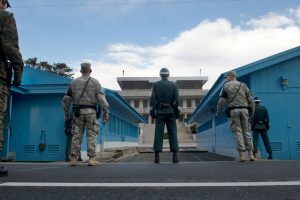Four years ago, in the wake of its last presidential elections, the U.S. was focused on North Korea’s nuclear tests and ICBM launches. Under President Donald Trump, Washington subsequently pursued a radically different policy towards North Korea. Now, the Trump era is coming to an end, and this will have profound implications for the situation in North Korea.
For the time being, North Korean leader Kim Jong Un appears to be laying low; North Korea has not released a statement about the recent elections, preferring to take a wait-and-see approach. The reason North Korea remained silent was simply that it was hoping for another four years of Trump, who enabled three face-to-face meetings in Singapore, Hanoi and Panmunjom.
On the first day of 2020, Kim Jong Un indicated that the United States remained a military threat and warned that “The world will witness a new strategic weapon to be possessed by the DPRK in the near future.” We did witness “a new strategic weapon” on October 10, when one of the largest ICBMs in the world appeared in the military parade for the 75th Anniversary of the Workers’ Party of Korea. That got the attention of the international community, but the ICBM was not test-launched. Kim appeared to be keeping his promise to Trump.
North Korea will not get economic sanctions lifted unless it negotiates with the United States. Moreover, even if South Korea’s Moon Jae-in were to offer economic cooperation as a way to appease his neighbor, actually executing that cooperation will be difficult. This is the harsh reality confronting Kim, who plans to rule for decades to come.
Trump, with his penchant for bold, top-down “deals” and his lack of interest in human rights issues, was always going to be easier for Kim to deal with. Had Trump been reelected, Pyongyang would have been well placed to win significant concessions, including the removal of economic sanctions and the normalization of diplomatic relations, by dangling before Trump the possibility of winning a Nobel Peace Prize.
These hopes have now evaporated. Kim Jong Un will have to confront a new president in Joe Biden and his Democratic Party, which has traditionally been tougher on human rights issues. The party has already shown its willingness to confront China over human rights. It is unlikely, then, that Biden will give North Korea a pass. At any rate, his own past statements suggest that North Korea will not be his top priority.
It will be hard for North Korea to change this, requiring a complex mix of carrots and sticks and words and deeds that somehow avoid human rights becoming an issue in negotiations.
In the meantime, North Korea has taken three economic body blows this year: COVID-19, flood damage in the summer, and severe sanctions. There has been a simultaneous sharp decline in the volume of reporting on Kim Jong Un’s movements. Not only has there been no diplomatic activity, there has been almost none of the usual on-site guidance at factories and farms. Kim’s public appearances have mostly been about giving guidance on infectious disease control at meetings of the Workers’ Party of Korea.
With its weak medical system, North Korea lacks the ability to combat COVID-19 clusters. Its foreign currency revenue is believed to have plummeted with extended measures to close its borders, in addition to the impact of economic sanctions. As it slides further into poverty, the Kim Administration is very likely hoping to find a way to turn things around.
In fact, North Korea will announce a new five-year economic development plan at the 8th Congress of the Workers’ Party of Korea, to be held in Pyongyang next January. The ongoing productivity campaign, the “80-day battle,” was launched to revive the North Korea economy. Idealism such as this naturally has its limits, though, running into structural realities. Without the removal of economic sanctions, which might be an outcome of progress in its relations with the United States, North Korea will not see the economic growth it wants. In that respect, Kim Jong Un’s speech at the Congress will be an early indicator of the likely direction of U.S.-North Korea relations under the Biden Administration.
Isozaki Atsuhito is an associate professor at Keio University.

































